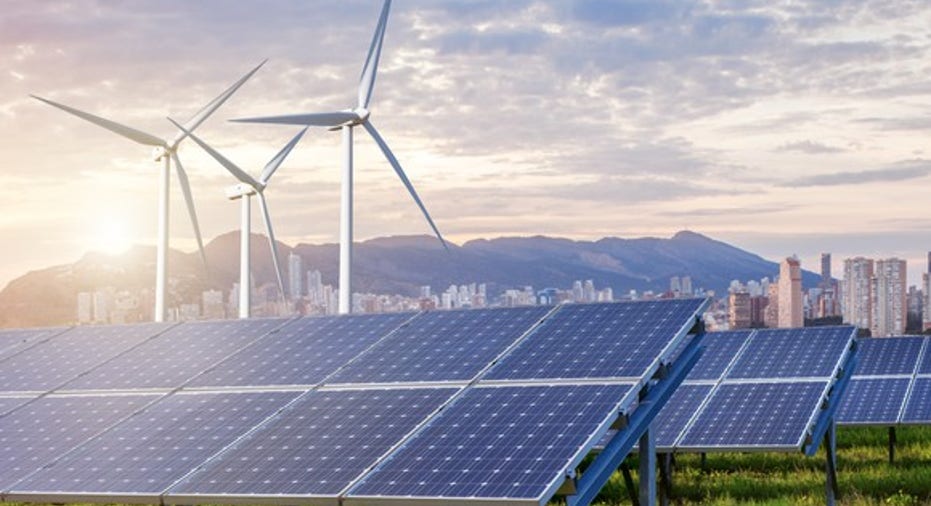Warren Buffett's Monopoly Days May Be Coming to an End

Image source: Getty Images.
Warren Buffett has spent billions building out his utility business on the thesis that it'll spit out cash for decades to come. But utilities may not be as safe as they were when he started buying them, and they could require some major strategic shifts.
Jonathan Weisgal, Vice President of Government Relations at Berkshire Hathaway , recently admitted, "Our monopoly days are coming to an end. We are in a competitive market and we have to recognize that as a utility." That's a stirring admission and a change from a century of stability and growth for utilities. And with so much of Berkshire Hathaway's business tied up in utilities, this is a big deal for investors.
Why Buffett bought utilities in the first place
When Warren Buffett started acquiring utility assets in the late 1990s, it seemed like a perfect business for him. Regulated returns, slow and steady growth, and lots of cash flow are really attractive to Buffett. He can also benefit from having very low borrowing costs in the Berkshire family. In his annual letter to shareholders in 2009 he said:
I'm sure regulators still see Berkshire Hathaway as a purchaser of choice, but today the customer is the one gaining power. MGM Resorts and Wynn Resorts have both said they'll pay tens of millions of dollars to leave Buffett utility NV Energy, and customers big and small are looking at rooftop solar and energy storage as ways to reduce utility bills, both saving money and lowering their environmental footprints. And those are challenges Buffett may not have envisioned just a few years ago.
Customers are driving the shift in utilities
Since the electric grid was developed, it was based around centralized power generators and a distribution grid that pushed energy to customers. The power was held by the utility, which is why it's so highly regulated in the first place.
But in the last few years, customers have been given choices to reduce their dependence on the grid or leave it altogether. I mentioned MGM's and Wynn's moves in Nevada, but Walmart, Apple, and Macy's are just a few of the corporate customers who are installing their own rooftop solar and/or building power plants offsite to supply their own electricity. Heck, Apple just launched an energy companyto sell electricity to outside customers.
On the residential side, around a million customers have gone solar with installers like SolarCity and Vivint Solar making it possible to create your own power with no money down. They're selling customers on the idea that creating their own energy is better than buying from the utility -- and from a retail standpoint, that's the most choice customers have ever had in energy.
Utility customers are the ones driving change at utilities, whether it's a drive to lower costs or to produce their own energy. And that's a challenge for Berkshire Hathaway Energy.
Will renewable energy help Berkshire Hathaway?
Even if the regulated utility business Buffett has amassed comes under pressure, he still has a massive presence in renewable energy to fall back on. He's spent at least $15 billion on wind and solar assets and has said he's ready to spend $15 billion more. And these are projects with long-term contracts to sell energy, primarily to utilities Buffett doesn't own.
But this also shows the strange relationship Buffett has with renewable energy sources in general. He's a big fan when he's the owner, but when his customers decide it's in their best interest to own renewable energy assets, his companies do everything they can to undermine them (see the net metering ruling that killed Nevada's rooftop solar industry).
The days of utility monopolies may be numbered
Warren Buffett has spent billions amassing a large regulated utility business that was supposed to generate solid returns for decades to come. But the business may not be as safe as it used to be with one of Warren Buffett's own executives even admitting that monopoly status may not be around for utilities much longer. That could mean Berkshire Hathaway's energy returns won't be what investors had hoped for either.
The article Warren Buffett's Monopoly Days May Be Coming to an End originally appeared on Fool.com.
Travis Hoium owns shares of Apple, Berkshire Hathaway (B Shares), and Wynn Resorts. The Motley Fool owns shares of and recommends Apple, Berkshire Hathaway (B Shares), and SolarCity. The Motley Fool owns shares of Wynn Resorts and has the following options: long January 2018 $90 calls on Apple and short January 2018 $95 calls on Apple. Try any of our Foolish newsletter services free for 30 days. We Fools may not all hold the same opinions, but we all believe that considering a diverse range of insights makes us better investors. The Motley Fool has a disclosure policy.
Copyright 1995 - 2016 The Motley Fool, LLC. All rights reserved. The Motley Fool has a disclosure policy.



















